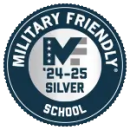ACCT-130
Explore Business Management
Whether you're just starting out, changing careers or seeking to advance in your field, an online associate degree in business management can help you reach your goals.
Learn how to finish your program faster with credit for prior learning and experience.
Build Your Career Future
In today's complex business landscape, individuals who can effectively work in day-to-day business operations are in high demand. Our online associate degree in business management arms you with the business acumen necessary to succeed in a variety of career paths, through business management classes and course studies that bring together multi-disciplinary skills in key specializations such as market research, data analysis and financial accounting. Your coursework will round out foundational business administration skills with in-demand soft skills that you can apply throughout your career. Plus, it's a solid stepping stone toward a full bachelor's degree in business management for those who are returning to school after time away, or embarking on their first degree.
Program Curriculum
Champlain's online business management courses encompass the top skills needed by today's business professionals. Graduates of the program are required to complete the following courses.
Professional Courses (27 credits)
General Education Courses (21 credits)
Business Electives (6 credits)
General Electives (6 Credits)
Accounting is the language of business. This course introduces the student to accounting from the point of view of the user of financial reports and is appropriate for personal as well as business applications. Students explore the impact of transactions on the financial position and profitability of a business, and analyze financial reports of real-world corporations.
Managerial accounting focuses on the needs of management for accounting information to make informed decisions in the internal operations of a company. Topics include decision-making, accounting for planning and control, cost-volume-profit relationships, and budgeting.
Prerequisites
Provides an overview of the entire legal system, with an emphasis on contract rights. Discusses the essential elements of a contract, the breach of contracts and the remedies for breach. Presents business and consumer laws, including white-collar crime, landlord-tenant rights, real property interests and administrative law.
Students will explore foundational topics such as entrepreneurship, technology, ethics, leadership, and business development while examining the latest trends shaping the global business landscape. Through real-world case studies, hands-on activities, and collaborative projects, students will gain practical knowledge and skills to navigate the dynamic and evolving business environment. This course prepares students to understand business operations, think critically, and develop strategies for success in their future careers.
Business analytics and data visualization transform data into business insights to allow for better decision-making. This course utilizes a combination of existing datasets and common analytics tools to teach new and emerging managers, without backgrounds in data science, how to evaluate data, consider available options, and present a graphical representation of data outcomes for decision-makers.
MGMT 240 is a finance course for managers. It explores financial measurements, the artful application of numbers to solve problems, building financial analysis skills, and the big-picture context needed to understand why finance matters in business management and decision-making. A subset of topics covered in the course include the time value of money, financial statement analysis, ratio analysis, investments, and capital management.
This course introduces the core terminology and principles of marketing. Students learn about the marketing mix (product, price, place, and promotion), market segmentation, and how external factors such as the economy, technology, culture, and competition influence marketing decisions. The course also examines how marketing fits within an organization and contributes to business success, along with how ethical considerations, cultural awareness, global trends, and social responsibility shape marketing practices across industries. No prior business experience is required.
The perspectives, beliefs, and preferences of employees in today's workplace are more diverse than perhaps ever before. Today's high-performing managers are those who foster inclusive, positive, and responsive organizational cultures for their people. But with such varied perspectives, what cultural considerations make the most sense for an organization? Management in the 21st Century will teach students how to foster a workplace environment where people can flourish and are motivated to meet objectives and ambitions for the organization.
Students will learn about the application of positive individual and group strengths and capacities that can be recognized, evaluated, and expanded to advance organizational well-being. This course encourages students to apply positive organizational behavior processes to everyday challenges organizations face to drive positive workplace behaviors and outcomes. This course also helps students to practice and gain skills, knowledge, and competencies to become positive and impactful leaders and change-makers from whatever position they hold.
Project Management is the formal application of knowledge, skills, tools, and techniques to project-based activities to meet organizational requirements. Project management is accomplished through the use of processes such as Initiating, Planning, Executing, Monitoring and Controlling, and Closing. Project managers can divide projects into these phases to provide better management control with appropriate links to the ongoing operations of the organization. Collectively, these phases, known as the project life cycle, form the foundation for the practice of project management and are guided by the Body of Knowledge from the Project Management Institute (PMI).
This course introduces students to the foundational concepts needed to communicate effectively in writing for academic study and professional development. Students will also learn to read critically to evaluate an author's message. Students will be introduced to rhetorical modes and their role in the development of written communication. Students will also learn how to use revision strategies to create written communication that meets its intended purpose for its intended audience
This course builds on students' proficiency in the writing process and rhetorical modes to introduce the use of sources in written communication. Students will practice information literacy as they learn to determine information needs from sources, develop effective search strategies, and incorporate sources in written communication, legally and ethically.
Prerequisites
Complete ENGL-100
Starting with a frame of human communication as a dynamic system of interactions in which people make choices that impact their relationships, other people, and themselves, students will define theory-informed communication concepts and processes, and critically examine how they apply to everyday life across a variety of contexts. Students will reflect on how the theory, concepts and processes apply to their own lives in becoming competent communicators who are knowledgeable, skilled, and versatile.
Students will learn and apply critical inquiry skills to analyze persuasive communication created by others and to develop persuasive communication/arguments of their own to solve problems in professional, civic, social, and personal contexts. Specifically, students will learn to recognize fallacies in logic; apply inductive and deductive reasoning strategies to the interpretation and development of persuasive communication; evaluate the validity of sources; and develop logically sound persuasive communication. Students will explore the roles of self-awareness, empathy, and ethics in the context of critical inquiry and the development of arguments.
Prerequisites
Complete ENGL-110.
Mathematical reasoning, when applied to everyday and professional lives, has two dimensions: logic for deterministic situations and probabilities for non-deterministic situations. This course aims to help students develop these mathematical reasoning skills.
This course introduces students to basic statistics for data literacy. With a focus on exploring real-world data, students will interpret numerical information and utilize the tools necessary to complete the entire statistical process: designing a study; gathering, organizing, and analyzing sample data; and making inferences about a population. Students will demonstrate data-driven decision-making and effective communication of numerical data.
Introduces students to the biochemistry and physiology of nutrition and exercise. Emphasis will be placed on human body systems such as musculoskeletal, digestive, respiratory and circulatory, and their relationship to nutrition and fitness. Students will also study the biochemistry of energy conversion as it relates to exercise physiology. Laboratory sessions are designed to reinforce, by a hands-on approach, the principles discussed in lecture. Course includes two laboratory hours per week.
Students will develop the ability to apply scientific methods to understand the natural world, to identify scientific aspects of daily life, and to evaluate the quality of scientific information based on its source and the methods used for its generation.
Principles of Economics introduces the fundamental concepts of economics - the study of how people manage resources, and how they react to scarcity. This course focuses on both microeconomics (the behavior of consumers and companies) and macroeconomics (large-scale economic factors such as employment and interest rates), so that you'll gain a broad understanding of how a modern market economy functions, how decisions in business settings are informed by economics, and how economics applies to your everyday life.
Additional Program Information
Graduates of the business management associate online degree program will demonstrate the following industry-specific skills, knowledge, and competencies.
- Utilize Strengths: Cultivate and leverage an organization's assets and human strengths to help transform workplace culture and optimize performance
- Use Business Acumen. Identify, contextualize, and utilize core business functions to address business challenges
- Communicate Effectively. Make use of communication approaches that motivate, articulate, generate and achieve desired results
- Use Business Technology For Advantage. Identify technology that captures, analyzes, and shares organizational data and information, and creates business value
Our admissions team seeks to admit students who:
- Demonstrate a solid academic foundation - a minimum 2.5 GPA is our recommendation, though exceptions may be made on a case-by-case basis for those who demonstrate a potential for academic success in other ways.
- Possess an aptitude for success in an online learning environment.
- Exhibit the ability to make a positive contribution to the Champlain College Online community.
To learn more about submitting transcripts, or requirements for home-schooled students, those educated abroad or returning students visit our Undergraduate Admissions page.
Our transfer credit evaluation team works hard to ensure you get the transfer credits you deserve, from a variety of sources including prior college credits, work experience and training, military training and experience, and more. Our goal is to help you graduate from Champlain College Online as quickly and affordably as possible. Visit our Transfer Credit Options page to learn more.
Champlain College Online's business faculty, led by Department Chair Dr. Elaine Young, are expert practitioners in the field. Their industry expertise ensures that our business management curriculum is aligned with the needs of employers, and reflects the skills today’s business professionals need for success. Classes led by our seasoned experts will give you real-world insight into the business world, and create a rich community of career-focused learning.
Tuition & Costs
Online Undergraduate Tuition Fall '25 - Summer '26
Tuition & Costs
Online Undergraduate Tuition Fall '26 - Summer '27
* Alumni is defined, for this tuition rate, as any degree program graduate from Champlain College or Champlain College Online.
** Veteran rate effective Spring 2025, not retroactive
See the undergraduate cost of attendance and fees here
Affordability and Paying For Your Education
We provide a number of options to make your online education affordable, including preferred tuition for alumni, associate degree graduates, community college graduates, and military.
Move Your Business Career Forward
Business and financial occupations are expected to grow 8% from 2020 to 2030, which is faster than the average growth for all fields, as a result of an increasingly complex global business landscape. The median annual wage for these roles is $72,250.*
Graduates of Champlain's online business management associate degree program will be prepared to succeed in a variety of career paths across many fields and industries, including human resources, business analysis, administrative services, operations, and sales.
*Source: Bureau of Labor Statistics (BLS), 2020; jobs titles: Payscale, 2020
Top Jobs for Associate in Business Management Graduates
- Administrative Assistant
- Executive Assistant
- HR Assistant
- Office Manager
- Operations Support Specialist
- Payroll Administrator

Why Champlain
Affordability & Flexibility
"The affordability and flexibility I found at Champlain made obtaining my degree an achievable goal. The programs are rigorous, and the combination of the educational material with soft skills was invaluable and directly applicable to my workplace."

Academic Excellence and Recognition

Regionally accredited by the New England Commission of Higher Education

Designated as a Military Friendly School for our commitment to the military community
Ranked among the best by Tech Guide for game design and computer science

Named the among the best schools with accelerated bachelor's degrees by Intelligent.com
Meet The Program Director
Elaine Young, PhD
- Digital Marketing (B.S.)
- Digital Marketing and Technology (M.S.)
- Digital Media (B.S.)
- Esports Management (B.S.)
- Marketing (M.S.)
- Marketing Analytics (M.S.)
- Marketing & Communication (B.S.)
- Marketing Management (B.S.)
About
Dr. Elaine Young is the Program Director for Marketing, Design and Esports, and Curriculum Innovation Faculty Lead at Champlain College Online.
As program director, Dr. Young manages the faculty, curriculum, and assessment for undergraduate and graduate programs in the marketing area as well as developing and teaching courses. As Curriculum Innovation Faculty Lead, Dr. Young supports creation of new curriculum offerings that serve both the needs of adults continuing their education and employers who need educational opportunities for their employees. Prior to her role in Champlain College Online, Dr. Young has been part of the Champlain College community since 2000 as a professor and faculty advisor for traditional on-campus students. She is a HubSpot Educator and a Certified Appreciative Advisor.
Dr. Young has a Ph.D. in Organizational Management from Capella University, where her dissertation research examined technology use and adoption of college students. In addition, she holds an M.S. in Internet Strategy Management from Marlboro College, a B.S. in Communication and Public Relations from SUNY Brockport and an A.S. in Communication from Genesee Community College. Dr. Young has over ten years of experience in the Marketing and Public Affairs profession, specializing in nonprofits. She is the author of “Tuned-in Family: How to Cope, Communicate and Connect in a Digital World” (2014).

FAQs: Business Management Associate Degree
Business Management associate degree programs examine the key aspects of management and leadership in a business environment. These areas include leadership and communication, financial management, marketing and sales, organizational behavior, and critical thinking and problem solving.
Yes, you can apply your Business Management Associate’s degree toward a Bachelor’s degree. Champlain College Online offers a Bachelor of Science in Business Management with various concentrations, such as Human Resource Management, Marketing, Project Management, and Business Development and Sales.
Champlain College Online's Business Management Associate’s degree is designed to be completed in approximately 1 year and 8 months when taking 2 courses per term, with an estimated time commitment of 12–15 hours per week. The fully online program is tailored for working adults, offering flexibility to balance education with professional and personal responsibilities.
You May Also Be Interested In
Get Your Business Management Program Guide
Learn what you can expect from our associate in business management program.

Download Program Guide
I acknowledge that, by clicking the "submit" button, I am giving my express written consent to Champlain College and its representatives to contact me about educational opportunities via email, text, or phone, at the phone number above, including my mobile phone, using an automatic dialer, or pre-recorded message. Message and data rates may apply. I understand that my consent is not a requirement for enrollment, and I may withdraw my consent at any time.






